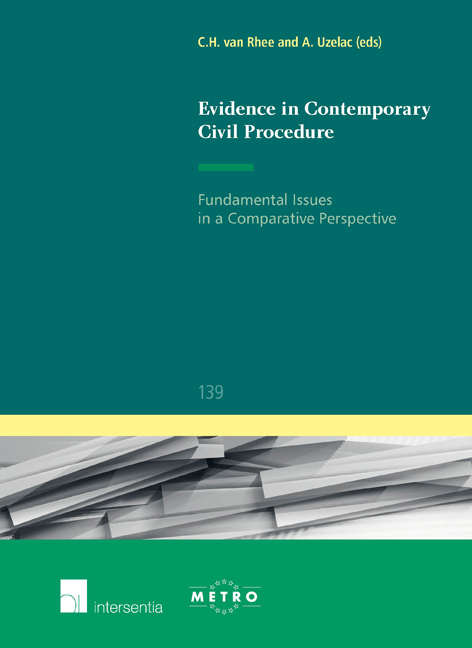Book contents
- Frontmatter
- Contents
- List of Authors
- Acknowledgements
- INTRODUCTION
- FUNDAMENTAL AND OTHER PRINCIPLES OF EVIDENCE IN CIVIL LITIGATION
- EVIDENCE AND THE PRINCIPLE OF PROPORTIONALITY. HOW TO GET RID OF EXPENSIVE AND TIME-CONSUMING EVIDENCE?
- DISCLOSURE OF DOCUMENTS IN CIVIL PROCEDURE: THE PRIVILEGE AGAINST SELFINCRIMINATION OR A QUEST FOR PROCEDURAL FAIRNESS AND SUBSTANTIVE JUSTICE
- PRECLUSION OF LATE ALLEGATIONS AND EVIDENCE AS A TOOL TO INCREASE THE EFFICIENCY OF CIVIL PROCEEDINGS IN POLAND: A SHORT STORY OF THE UGLY PAST AND THE WAY TO A BRIGHT FUTURE
- THE ‘RIGHT TO PROOF’ AND THE ‘LOYALTY PRINCIPLE’: A FRENCH PERSPECTIVE
- RESTRICTIONS ON THE ADMISSIBILITY OF EVIDENCE
- TAKING LENIENCY DOCUMENTS AS EVIDENCE IN DAMAGES ACTIONS IN CASES OF COMPETITION LAW INFRINGEMENT
- LOST IN TRANSLATION? LANGUAGE DIFFERENCES AND THEIR IMPACT ON EVIDENCETAKING IN LITIGATION
- EVIDENCE, INFORMATION TECHNOLOGY AND PRINCIPLES OF CIVIL PROCEDURE – THE HUNGARIAN PERSPECTIVE
- THE POTENTIAL IMPACT OF ELECTRONIC PROCEEDINGS ON TRADITIONAL PRINCIPLES OF CIVIL PROCEDURE – THE SLOVENIAN EXPERIENCE
- TYPES OF EVIDENCE IN CIVIL LITIGATION
- EVIDENCE IN ARBITRATION AND NATIONAL CIVIL LITIGATION
- REGISTRAR
- EVIDENCE IN CROSS BORDER CIVIL LITIGATION
- IUS COMMUNE EUROPAEUM
THE POTENTIAL IMPACT OF ELECTRONIC PROCEEDINGS ON TRADITIONAL PRINCIPLES OF CIVIL PROCEDURE – THE SLOVENIAN EXPERIENCE
from FUNDAMENTAL AND OTHER PRINCIPLES OF EVIDENCE IN CIVIL LITIGATION
Published online by Cambridge University Press: 15 December 2017
- Frontmatter
- Contents
- List of Authors
- Acknowledgements
- INTRODUCTION
- FUNDAMENTAL AND OTHER PRINCIPLES OF EVIDENCE IN CIVIL LITIGATION
- EVIDENCE AND THE PRINCIPLE OF PROPORTIONALITY. HOW TO GET RID OF EXPENSIVE AND TIME-CONSUMING EVIDENCE?
- DISCLOSURE OF DOCUMENTS IN CIVIL PROCEDURE: THE PRIVILEGE AGAINST SELFINCRIMINATION OR A QUEST FOR PROCEDURAL FAIRNESS AND SUBSTANTIVE JUSTICE
- PRECLUSION OF LATE ALLEGATIONS AND EVIDENCE AS A TOOL TO INCREASE THE EFFICIENCY OF CIVIL PROCEEDINGS IN POLAND: A SHORT STORY OF THE UGLY PAST AND THE WAY TO A BRIGHT FUTURE
- THE ‘RIGHT TO PROOF’ AND THE ‘LOYALTY PRINCIPLE’: A FRENCH PERSPECTIVE
- RESTRICTIONS ON THE ADMISSIBILITY OF EVIDENCE
- TAKING LENIENCY DOCUMENTS AS EVIDENCE IN DAMAGES ACTIONS IN CASES OF COMPETITION LAW INFRINGEMENT
- LOST IN TRANSLATION? LANGUAGE DIFFERENCES AND THEIR IMPACT ON EVIDENCETAKING IN LITIGATION
- EVIDENCE, INFORMATION TECHNOLOGY AND PRINCIPLES OF CIVIL PROCEDURE – THE HUNGARIAN PERSPECTIVE
- THE POTENTIAL IMPACT OF ELECTRONIC PROCEEDINGS ON TRADITIONAL PRINCIPLES OF CIVIL PROCEDURE – THE SLOVENIAN EXPERIENCE
- TYPES OF EVIDENCE IN CIVIL LITIGATION
- EVIDENCE IN ARBITRATION AND NATIONAL CIVIL LITIGATION
- REGISTRAR
- EVIDENCE IN CROSS BORDER CIVIL LITIGATION
- IUS COMMUNE EUROPAEUM
Summary
Introduction
Until recently, new means of information and communication technology (ICT) had a limited effect on traditional civil procedure. Currently, new methods for storing, gathering and disseminating data are being considered by the courts, and using digital technology in courtrooms has become a reality. However, the incorporation and use of new technologies does not merely signify a technical challenge; it has an impact on traditional procedural values and, moreover, procedural and especially evidentiary rules. While the use of electronic technology in civil proceedings may promote efficiency and raise the quality of civil proceedings, the focus on efficiency should not overshadow the perceived legitimacy of the proceedings.
Civil procedure is selective as regards the information that can be considered in court actions. It provides for rules, which the court has to follow when reaching its decision. Civil proceedings consist of a series of acts by the parties and the court. These acts are performed simultaneously or consecutively, and the civil procedural rules determine the ensuing procedural consequences. The principle of legality is the basic criterion for the admissibility or inadmissibility of procedural acts.
The use of modern technology may improve the functioning of some traditional procedural principles if appropriate legal guarantees are provided. One of the main concerns is whether ICT, as a generator of swift proceedings and simplified solutions, will influence the right of access to justice and comprehensively contribute to the judicial protection of rights and the efficiency of litigation.
Due to recent developments in the use of ICT in different fields of everyday life as well as in the field of justice, the concept of e-justice used in the frameworks of both European procedures and national justice systems should be further defined. E-justice could be broadly defined as covering the use of ICT in all fields of justice. In the European context, an e-justice system should provide the following functions: 1. Access to information in the field of justice; 2. ‘Dematerialization’ of cross-border judicial and extrajudicial proceedings; and 3.
- Type
- Chapter
- Information
- Evidence in Contemporary Civil ProcedureFundamental Issues in a Comparative Perspective, pp. 155 - 172Publisher: IntersentiaPrint publication year: 2015

